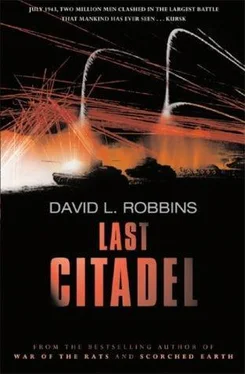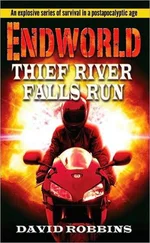Nothing about the Soviet counterstroke impressed Luis, not even their numbers and the will to squander them. Without their network of trenches and solid defenseworks, the Red infantry were routed swiftly out of foxholes. Antitank guns were abandoned, damaged T-34s were left with their motors running, prisoners came out of the haze with empty hands high. Leibstandarte was outnumbered and outgunned in the grainfields in front of Komsomolets, as they had been on every battlefield since Citadel began. Even so, the Soviet resistance moved aside from Luis’s tanks like geese in the road. By noon, the first grenadiers had entered Komsomolets. Twenty T-34s stood ruined on the steppe behind them, most killed by German tanks, a few blown up by grenadiers in close fighting. The rest of the Soviet force retreated east of the state farm to regroup behind Hill 241.6, to come in another wave later. Leibstandarte captured the farm and spent none of its own precious tanks, perhaps fifteen soldiers dead and fifty wounded. In the lull before grinding up Hill 241.6, while the grenadiers consolidated their hold on the farm buildings, Luis slipped his panzer company into the small forest next to the riddled silos. He crashed his Tiger and his Mark IVs into tree trunks, knocking them down with a careless pride, to make a place for his men and weapons to rest a little while. The green calm of the trees belied the havoc beside the Prokhorovka road. He ordered up ammunition and fuel, food and cigarettes for his tankers. He accepted a mound of mashed potatoes on a plate topped with a warm brown gruel and ate only a quarter of it. Strolling to the edge of the copse, he looked two kilometers east, up the gradual incline of Hill 241.6, the next objective on the road to Prokhorovka.
This is the soldier’s discipline, he thought. Do the job at hand, nothing more, then wait for orders to do another. But he believed he was here in this battle for a reason beyond the others, the grimy tankers and dirty plodding infantrymen, half-deaf artillerymen, crazy pilots, even the fat generals and their pretty staffs. Luis, alone of them all across every horizon today, knew there was no battle for Kursk, there was no Citadel. Those were only labels that would live in history books. No man lives on a page, he lives in his minutes and his skin. Whatever kingdom Germany or Russia carved out of this bloodied land would not survive, none ever has and none ever will, power is transitory, dominion becomes printer’s ink and dust. Nothing outlives a man, not a crown, not a conquest, nothing but a name and honor. It is better to be honored than to be a king. Luis crossed himself there on the edge of the woods, it felt like he was praying, and he thought of Jesus, who was not a king, he thought of his own father, who had outlived many bulls and recalled all the best of them. He thought of Thoma who’d died so stupidly, all his honor trickled out. He smiled at the Russians on Hill 241.6, because he was sent here out of the many thousands to become great.
He turned and looked down the line of his fourteen tanks, at all the pushed-down trees and bared roots. Men sat on the prone trunks eating rations, fuel trucks delivered drums of gasoline, more shells were loaded by bare-chested soldiers. He stood before them and they were oblivious to his gaze, as they should be. They were invisible to history. Anything these men and tanks did belonged to him, their names would make a stack to lift his own.
Luis was in a fine mood. He chuckled at the sight and sound of the little motorcycle coming again to bring him a message. The bike with its toy spitting engine seemed funny beside Luis’s goliaths, the motorcycle dodged the trees his company had knocked over. The courier again found Luis and pip-pip-ed to him, holding out a yellow note. Luis gazed after the rider sliding away, and wondered if that rider would tell his grandchildren one day that at Kursk he was a delivery boy to la Daga .
Luis read the note. The attack on Hill 241.6 was to start at 1300 hours. Totenkopf had not yet crossed the Psel. South of the rail mound, Das Reich was barely keeping up with Leibstandarte’s forward units. Nonetheless, Leibstandarte was ordered to plunge ahead and take the hill. Again, Luis thought, I am at the knife’s point of the battle. He folded the note into his pocket and walked to stand near his massive Tiger, to be seen with it, linked to it always by those who would tell later of these fiery days.
At the assigned moment, his company roared out of the forest beside Komsomolets farm. Luis ordered all tank commanders to exit the copse with hatches down and secured. Within seconds of leaving cover, the Soviet artillery opened up on them. He shouted a command into the radio for his company to scatter by platoon and provide support for the advancing grenadiers. ‘Come left!’ he called to his driver. There was no way to motor straight up the slope, the defense was too withering. He stared into his optics, straining to find a target but so much earth was suspended in the air from the artillery lavished down on them he couldn’t pick out anything that resembled a Russian tank. Balthasar had his hand poised on his flywheel to respond the moment Luis called him into a shot. The loader squatted on his stool with a shell across his lap, ever faithful to the always-hungry breech.
For thirty minutes Luis yanked his Tiger and his Mark IVs back and forth along the base of the long hill. The Russians on the high ground did not spare their ammunition, and he kept his tanks running and difficult to hit. Balthasar did not fire a round, but the Tiger crept among the grenadiers, waiting, prowling for a prey. None presented itself, and Luis would not fire blindly at the crest of the hill, that was the job for his own artillery. He was a tank hunter. The Reds would oblige him if he was patient.
By 1400 hours the grenadiers had slogged only a hundred meters up the grade of Hill 241.6. His company skulked alongside them, still without the Soviet armor offering itself for an open fight. Gazing out his periscope, Luis saw the first globs of rain splash on the deck. Thunder added its voice to the growl of his Tiger’s massive engine and the cracking rumble of cannon fire. This weather takes care of the air cover, Luis thought. A slow approach had just become slower.
The Tiger jolted. Luis snapped back from the brow pad of his optics, Balthasar below him recoiled as if hit in the jaw. Luis’s ears rang even under his padded helmet and headphones. He darted his eyes about the tank compartment; everything was intact. Balthasar shook his head and rammed his eyes back into his range finder. Luis did the same. His vision was blocked by a lick of flame and billowing smoke. A Red shell had smacked his Tiger on the nose. Luis ordered the driver to stop. As long as the Reds were coming straight for him, the Tiger’s armor could stand up to anything they threw. He wanted a clear, still look at what had shot him.
The smoke wafted away. Under a beaded curtain of rain, he spotted ranks of Soviet tanks in two, three, four rows powering down the hill. The Russians always attacked in waves. The T-34s rolled down in another hundred, as though that were their smallest integer. They were speedy, better in the mud than the heavy Tiger, even quicker than the Mark IVs. The panzer grenadiers greeted the Red tanks with antitank fire that knocked out a quarter of the first echelon in the initial minute of the charge. Balthasar, unleashed, stomped on the firing pedal again and again. Luis gave orders with his eyes glued to his commander’s optics.
The Russians stayed at a distance and Luis’s company parried, toiling forward only slightly, trading shots. Luis held his panzers back; why charge into a charge and lose every advantage? The Reds had superior numbers, and after another hour of tumult, when the first tank assault was beaten back, a second torrent came down the hill. Luis had days ago stopped being dumbfounded at the multitudes the Soviets tossed into battle, but he shook his head at this. He followed his grenadiers through the clinging mud, keeping his fourteen tanks at a snail’s pace alongside them, answering the Red tanks, keeping them at bay. It would do no good for his company to mount the hill alone, they would not hold it against Red infantry; this was always the perversion of mobile armor, a machine was at its most vulnerable against a man.
Читать дальше












